仁爱版九年级英语教学设计
- 格式:docx
- 大小:23.24 KB
- 文档页数:6
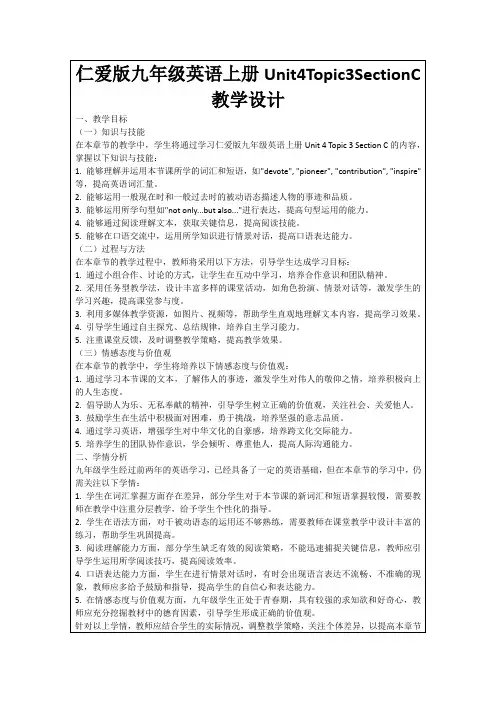
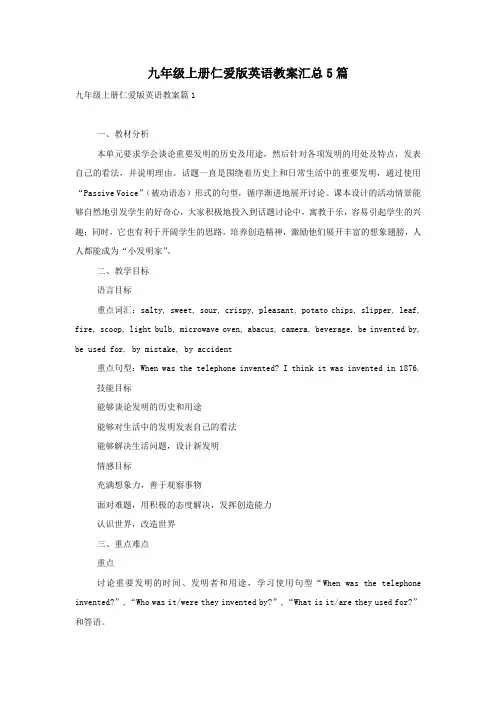
九年级上册仁爱版英语教案汇总5篇九年级上册仁爱版英语教案篇1一、教材分析本单元要求学会谈论重要发明的历史及用途,然后针对各项发明的用处及特点,发表自己的看法,并说明理由。
话题一直是围绕着历史上和日常生活中的重要发明,通过使用“Passive Voice”(被动语态)形式的句型,循序渐进地展开讨论。
课本设计的活动情景能够自然地引发学生的好奇心,大家积极地投入到话题讨论中,寓教于乐,容易引起学生的兴趣;同时,它也有利于开阔学生的思路,培养创造精神,激励他们展开丰富的想象翅膀,人人都能成为“小发明家”。
二、教学目标语言目标重点词汇:salty, sweet, sour, crispy, pleasant, potato chips, slipper, leaf, fire, scoop, light bulb, microwave oven, abacus, camera, beverage, be invented by, be used for, by mistake, by accident重点句型:When was the telephone invented? I think it was invented in 1876.技能目标能够谈论发明的历史和用途能够对生活中的发明发表自己的看法能够解决生活问题,设计新发明情感目标充满想象力,善于观察事物面对难题,用积极的态度解决,发挥创造能力认识世界,改造世界三、重点难点重点讨论重要发明的时间、发明者和用途,学习使用句型“When was the telephone invented?”,“Who was it/were they invented by?”,“What is it/are they used for?”和答语。
难点如何描述一项新发明的来历和用途四、课前准备老师准备“大百宝箱”(由中等大小的盒子、彩纸等DIY而成),flashcards;a package of potato chips, some bars of chocolate.学生准备上课前引导学生使用互联网等工具查询1a图片中5项以及自己感兴趣的发明物的来历,然后在准备好的.卡片反面写上关于这项发明的日期、发明者和用途等信息(如果学生查到的信息是用中文描述的,要求简单地翻译成为英文信息),正面写上发明物的名称,存放在自己制作的“小百宝箱”里。
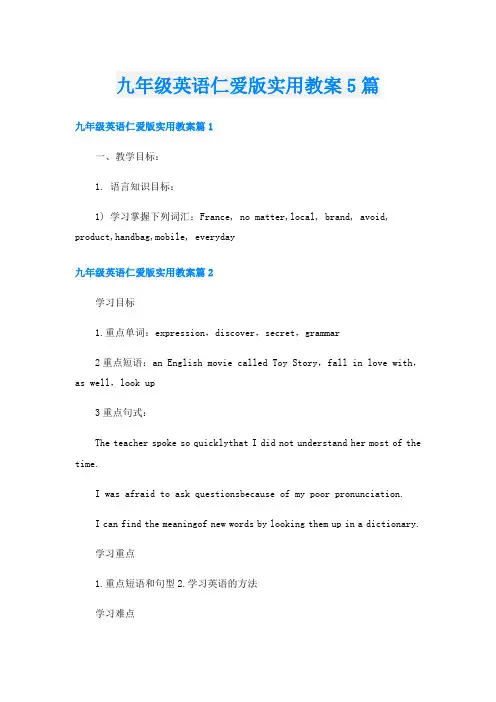
九年级英语仁爱版实用教案5篇九年级英语仁爱版实用教案篇1一、教学目标:1. 语言知识目标:1) 学习掌握下列词汇:France, no matter,local, brand, avoid, product,handbag,mobile, everyday九年级英语仁爱版实用教案篇2学习目标1.重点单词:expression,discover,secret,grammar2重点短语:an English movie called Toy Story,fall in love with,as well,look up3重点句式:The teacher spoke so quicklythat I did not understand her most of the time.I was afraid to ask questionsbecause of my poor pronunciation.I can find the meaningof new words by looking them up in a dictionary.学习重点1.重点短语和句型2.学习英语的方法学习难点学习英语的方法自主学习一、预习课本P3新单词并背诵,完成下面的汉译英。
1.表达_________2.发现________3.秘诀_______4.语法______二、认真预习P3找出下列短语和句型。
1.一部叫做Toy Story的电影2.喜欢上3.也4.老师说得如此的快以至于我大多数时间都不明白。
5.因为我的发音很差,我害怕问问题。
6.我通过在字典里查询找到新单词的意思。
课堂导学Step 1情景导入Teacher:Wei Fen really likes English and sheis a student who is good at English but she didnt use to like English.Do you knowwhat has changed her?Lets read the passageto find the answer.环节说明:由Wei Fen英语成绩的变化为话题,引起学生的好奇,同时又引出要学的内容。
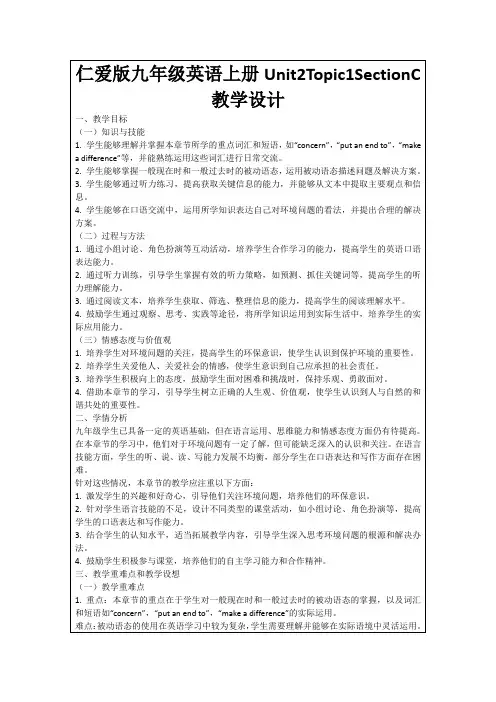
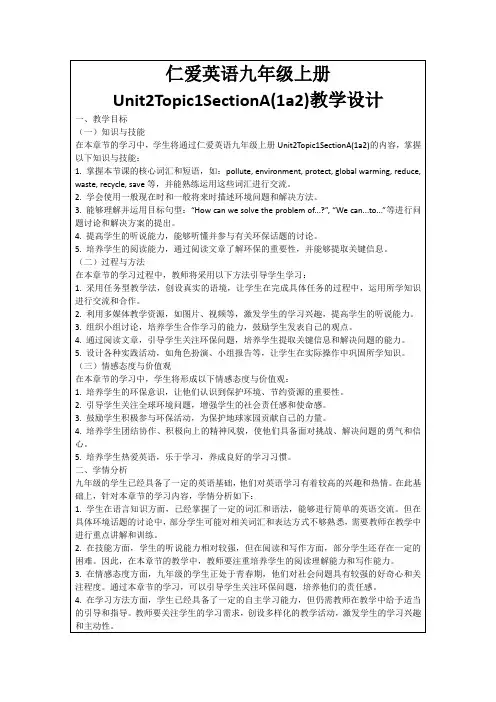
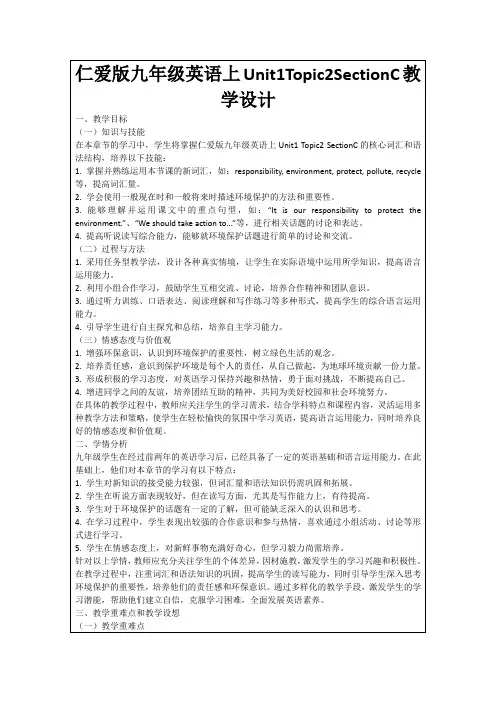
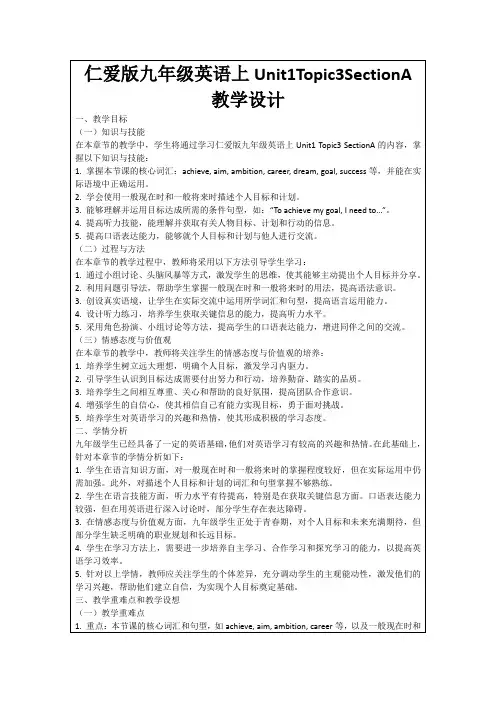
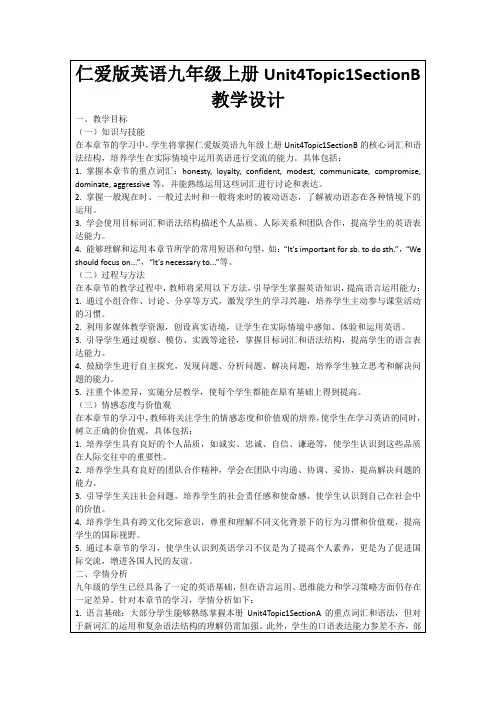
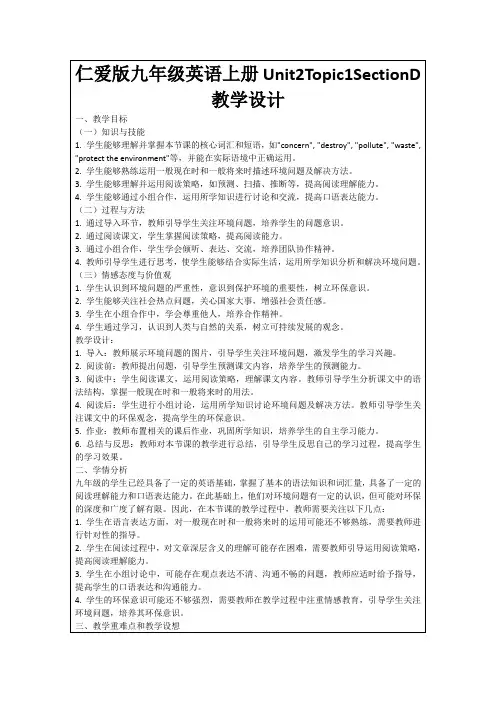
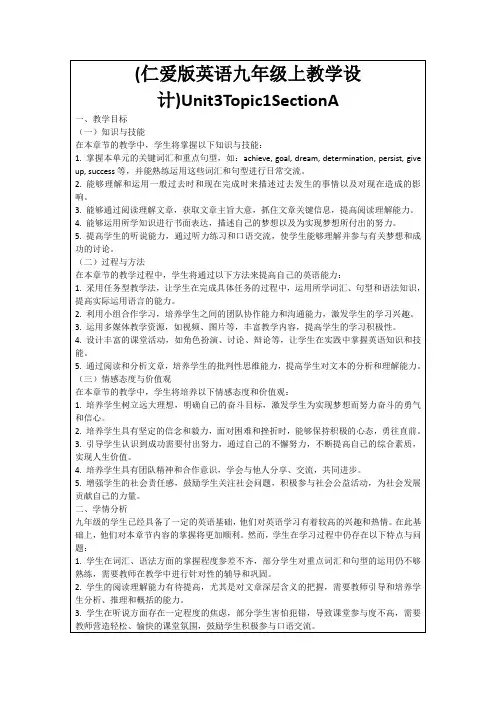
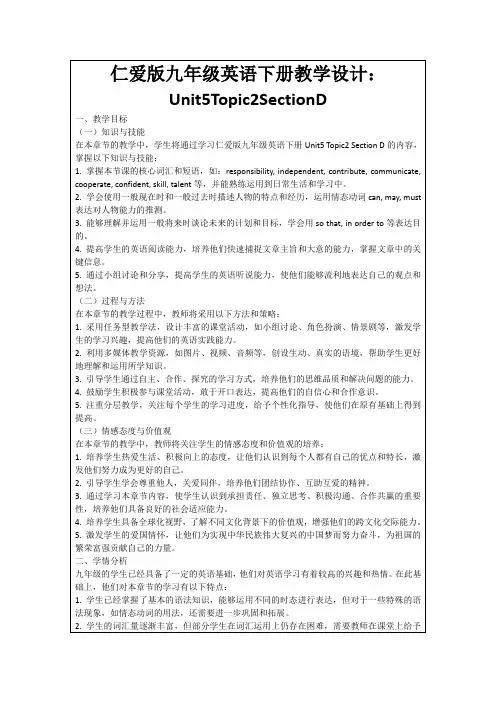
仁爱版九年级英语UNIT4 Topic1 Section D教学设计教材的分析本课处于仁爱英语九年级(上)Unit4 Amazing ScienceTopic1 Spaceships Are Mainly Controlled By Computers第四课时,话题主要围绕谈论神舟五号和嫦娥一号进而涉及到电脑在航天中的应用。
本话题从令人关注的神五入手,贴近生活,时代感强。
然后,,由飞船的成功运行联想到电脑科技,最后,由电子邮件的发送与接收回到电脑的应用的实际生活中。
教学中本着整合教材的精神,把本课的内容顺序进行调整,使之浑然成为一个整体,因为学生在学习本课前已经学习并掌握了部分关于谈论电脑科技的的句型,所以,教材的要求与学生现有的水平相一致。
通过本课的学习,学生对祖国的科技有了更深的了解。
更乐于接触现代科技:电脑、太空知识,口语表达能力和书面表达能力都会有所提高。
学生分析:我所任教的中学,是以优异的教学成绩闻名远近的初级中学,学生在严格的教学管理中,形成了良好的学习习惯,对英语学习有较浓厚的兴趣,英语基础扎实,他们活泼、有好奇心、有创新精神。
他们争强好胜,渴望成功。
他们追逐新鲜事物,对电脑、手机、MP3、宇宙飞船都非常感兴趣,本教材的选择符合学生的心理特点,在学习本课之前,学生已经掌握了有关电脑在科技中的用途、优点和缺点,和一些基本的语法、单词和句型,已初步具备了小组合作学习的能力和语言表达能力。
教学目标1、知识目标(1) Review Grammar: The Object Complement.(2) Know about the parts of computers and the use of them.(3) Know about how to send and receive an e—mail.2、教学方法Task—based Language Teaching3、途径Listing, speaking, reading, writing, debiting,4、理论依据Project English通过各种任务性的活动,巩固所学的语言知识;通过思考、体验、合作等方式来学习,培养学生独立思考的习惯以及口语表达和合作学习的能力,强化语言的运用和习得的过程,充分体现了语言的交际本质-----学以致用(Learning to do things)。
5、辅助手段采用多媒体电脑投影图片、PPT教学课件、充分利用网络资源;增大了课堂的容量;这样做是因为作为内驱动力的积极活跃的心理因素,对学习起到催化剂的作用,能大大提高学生对语言学习的兴趣和求知欲;这样能创设情景;活跃课堂气氛;营造语言氛围;吸引学生注意力;促进学生主动学习是课堂变得生动活泼、色彩鲜明、绚丽多彩是教学内容趣味化;提高英语教学的课堂教学效率。
重点:1.Sum up “Verb+ object+complement.”eful expressions.难点:Know about how to send and receive an e-mail.教具:Pictures,ppt,recorder,multimedia教学方法:Speaking, listening, reading, talking, writing,debating.Teaching Procedure(教学过程):Step1. Review(5`)1. T: Good morning, everyone!I`m very happy to seeyou here today. Before class begins please look at the big screen.Talk about the pictures.(1)(Teacher shows the picture of Chang`e flying to the moon.)T: Who is she? Who can tell me?S1: She is Chang`e. She is a beautiful goddess. The ancientlegend about her flying to the moon is known to all the Chinese.It shows…(2)(show the picture of Yang Liwei)T: Who is he? what is she doing?S2:He is Yang Liwei, he is the first Chinese to travel into space.和is our national hero. In 2003,he traveled around the earth inShenzhouV for 21 hours…All of us are very proud…(3)(Show a picture of a computer.)T: What`s this?S3:It`s a computer.T: Do you know the name of every part of computers? Do youoften use computers? What do you use it for?S4:...chat with my friends.T: What about you?S5:..download the music and songs……shopping on line……watching movies……get information…T: Great, I often use the computer at home or at school as well,you know. To tell you a secret, I often use computers to sendand receive an e—mail. Do you know how to send and receivean e—mail? Let me tell you. Please come to 1a.(通过这一部分的内容,复习展示了2b内容。
)Step2.Presention(10`)Listen to 1a and learn the new words and expressions:First paragraph(show some pictures.)turn on,connet to,evenlope,click on…Second paragraph:click on“new”,“to”,“subject”,“send”Third paragraph:“inbox”,“a list of message”click on “new message”,finish reading ,go back to “inbox”Step3 Consolidation(10`)1.Let students retell the steps of sending and receivingan—mail.2.Let students read 1a again and put the following picturesin the right order according to1a. Finish 1b.3.Let students send and receive an e-mail on the multimedia.Step4.Practice(12`)Divide the students into two groups, one is success grouptheir opinion is: Computers are good things; the other is dreamgroup,their opinionis: Computers are bad things.(Debating theadvantages and disadvantages.)Affirmative debater1:Computers have become every important in many areasof work and leisure. There is no doubt computers are very usefulin technology and business. So we think computers are goodthings.Negative debater1:Though computers improved our lives ,they havebrought many problems, too. So we think computers are badthings.Affirmative debater2:In space, computers help the astronauts control the speedand direction of a spaceship`s flight. It proves computers aregood things.Negative debater2:If we work on computers too much time ,we may getheadache and sour eyes. Bad for our health, so computers arebad things.……According to the SectionA---- SectionC, debating theuses of computers and disadvantages of computers .T :sum up:Well done! everyone! I think all of us want to know whichgroup will win, I tell you they both win, because they agued areboth sides of one problem, computers are good things becausethey are one of the great inventions in the 20th century, helpinghuman beings in many ways; computers are bad things becausethey can cause many problems. We must use computersproperly, make them serve us better…(呈现2a句子,适时对学生进行思想教育。